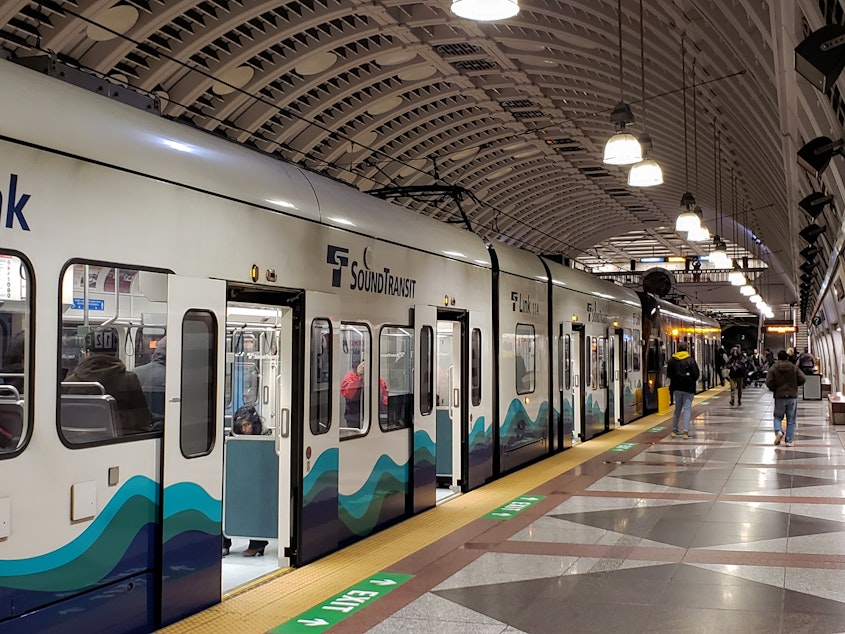What the federal stimulus bill means for Sound Transit projects

Federal funding could have brought light rail access to Tacoma, Everett, Ballard, and West Seattle sooner. But the final bill failed to come to the rescue, said Sound Transit's CEO Peter Rogoff.
Before Peter Rogoff came to Seattle to run Sound Transit, he worked as the undersecretary of transportation for President Obama. Not long before that, he worked in the Senate Appropriations Committee on transportation for 22 years.
So you could say Rogoff’s skills include knowing how to bring home the bacon — or at least knowing how the bacon is brought home.
Rogoff knew this stimulus bill could mean the difference between light rail projects delayed and light rail projects delivered ahead of schedule.
So when legislators finally managed to get details of the $900 billion stimulus package, published just hours before they voted to approve the package, Sound Transit’s analysts were ready to start crunching numbers, to figure out how much money would come their way.
Rogoff had reason for optimism. After all, earlier in the process, the House of Representatives’ version of the bill had leaned heavily into mass transit: $32 billion for transit nationally, with Sound Transit taking a huge chunk of that at $585 million. Much of that was thanks to a special $2.5 billion earmark for cities expanding their light rail network.
Sponsored
“Sound Transit was frankly the biggest beneficiary of that,” Rogoff said.
Sponsored
But as Sound Transit’s analysts crunched the new numbers, they came to a realization: Where the earlier house draft made Sound Transit a big winner, the final draft made Sound Transit a big loser.
Gone was the special treatment for light rail expansion in cities. Federal funding for transit had decreased by half, and Sound Transit’s share had withered down to $97 million, like a deflated balloon several days after a kid's birthday party.
“It’s a bit of a disappointment,” Rogoff said.
It's not nothing, Rogoff said. And he expressed gratitude that elected officials had found enough bipartisan spirit to "raise a bill from the ashes," following earlier failures at reaching compromise.
But the money coming to Sound Transit in the revised bill isn't enough to rescue the agency from a projected $6 billion to $12 billion revenue shortfall due to the pandemic and its associated recession, Rogoff said.
Sponsored
That means the difficult conversations Rogoff had been anticipating can no longer be avoided.
In the new year, Rogoff said, “We will have to revisit the timelines for all projects not currently in construction.”
That process, called “realignment,” will last through July, and is required by law. Sound Transit will have to return to the public, hat-in-hand, to say this can't be done as quickly as previously planned.
Sponsored
Sound Transit went through that process during the great recession of 2008, too, and had to reschedule many projects approved as part of the Sound Transit 2 voter package.
Rogoff promised that light rail access to Bellevue, Redmond, Lynnwood, and Federal Way will not be delayed.
“All but one of them are on time and under budget,” Rogoff said.
What’s at risk, he said, “is the next tranche of projects.” That means potentially longer timelines to bring light rail to Everett, Tacoma, Ballard, and West Seattle.
The reason it’s taking so long to build these systems isn’t because the construction and permits take so long, Rogoff said — it’s cash flow. Were the federal government to take up some of that burden, “we could get to some of these destinations more quickly," he said.
Sponsored
Rogoff is optimistic, however, that the Biden administration will take another run at transit funding in the new year.
“When I worked in the senate for 22 years, Joe Biden was often in our face to make sure there was adequate money for rail programs. Obviously Amtrak — that was near and dear to his heart,” Rogoff said. “We hope that will translate into real policy leadership to finally do something for leadership in the country, and we hope that that will allow us to accelerate our construction programs.”




